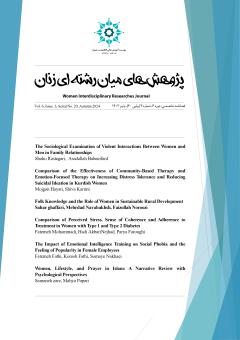The Sociological Examination of Violent Interactions Between Women and Men in Family Relationships
Subject Areas :
Shaho Rastegari
1
![]() ,
Asadallah Babaeifard
2
,
Asadallah Babaeifard
2
1 - Doctoral student of social issues of Iran, Kashan University, Kashan, Iran.
2 - Department of Social Sciences, University of Kashan, Kashan
Keywords: Family conflicts, violent interactions, marital relationships, sociology of the family, marital tensions.,
Abstract :
Tensions and conflicts in family relationships are among the significant social issues that have been examined from various perspectives. However, men's experiences of family tensions and the role of women in these conflicts have received less research attention, particularly in the cultural context of Iran, where traditional gender roles influence family dynamics. This study aims to explore different aspects of the relationship between emotional divorce and family tensions among married individuals residing in Tehran. This research is a survey-based correlational study that investigates the association between emotional divorce and men's experiences of family conflicts. The statistical population consists of all married men in Tehran in 2020. Using Cochran's sampling formula, 372 married men were selected through a multistage cluster sampling method. The findings indicate a significant relationship between certain individual variables, such as education level and occupation type, and the level of family tensions experienced by men, while no significant relationship was found with income. Moreover, the multiple correlation coefficient (R=0/757) suggests a strong relationship between the independent variables and family tensions. The adjusted coefficient of determination (0/564) further indicates that more than 50% of the variations in the dependent variable (family tensions) can be explained by the independent variables, including emotional divorce, cognitive divorce, behavioral divorce, and the socioeconomic status of both the individual and their spouse. The results of this study highlight that family conflicts are multidimensional phenomena influenced by individual characteristics and reciprocal interactions between men and women. Therefore, informed policymaking in family law should aim to promote a deeper understanding of the mutual roles in these conflicts. Additionally, raising public awareness about the various aspects of this issue and reducing social barriers to addressing and resolving these conflicts can contribute to improved family interactions and help mitigate negative consequences.
1- خیرخواه زاده، احسان(1390). مطالعه جامعه¬شناختی تجربه زیسته مردان از خشونت خانگی علیه آنان. پایان¬نامه کارشناسی ارشد. دانشگاه تهران. دانشکده علوم اجتماعی.
2- فیروزجائیان، علی اصغر؛ و رضایی چراتی، زهرا(1394). تحلیل جامعه¬شناختی خشونت زنان علیه مردان. فصلنامه توسعه اجتماعی(توسعه انسانی سابق)، 9(2)، 130-105. dor:20.1001.1.25383205.1393.9.2.5.6
3- قاضی¬زاده، هادی؛ زهراکار، کیانوش؛ کیامنش، علیرضا؛ و محسن¬زاده، فرشاد(1397). مدل مفهومی عوامل زمینه¬ساز خشونت زناشویی زنان علیه مردان از دیدگاه مردان. نشریه روان¬پرستاری، 6(4)، 47-35.
4- محمدخانی، پروانه؛ رضاییدوگاهه، ابراهیم؛ محمدی، محمدرضا؛ و آزادمهر، هدیه(1385). شیوع الگوی خشونت خانوادگی. ارتکاب یا تجربه آن در بین زنان و مردان. نشریه رفاه اجتماعی، 5(2)، 224-205.
5- Connell, R. W. (2005). Masculinities University of California Press. Berkeley, Los Angeles.
6- Dabral, S. (2024). The Unheard Cries of Gender Neutrality.
7- Conroy, E., Willmott, D., Murphy, A., & Widanaralalage, B. K. (2024). Does perpetrator gender influence attitudes towards intimate partner violence (IPV)? Examining the relationship between male-perpetrated and female-perpetrated IPV attitudes among a sample of UK young adults. Mental Health and Social Inclusion, 28(5), 617-627. doi:10.1108/MHSI-05-2023-0057
8- D. D. (2025). Socioeconomic inequalities in intimate partner violence: Evidence from Vietnam. Journal of interpersonal violence, 40(1-2), 31-55. doi:10.1177/08862605241245375
9- Henning, K., & Feder, L. (2004). A comparison of men and women arrested for domestic violence: Who presents the greater threat? Journal of Family Violence, 19(2), 69–80.
10- Johnson, M. P. (2010). A typology of domestic violence: Intimate terrorism, violent resistance, and situational couple violence. Upne.
11- Kumar, A. (2012). Domestic violence against men in India: A perspective. Journal of Human Behavior in the Social Environment, 22(3), 290-296. doi:10.1080/10911359.2012.655988
12- Lawson, J. (2012). Sociological Theories of Intimate Partner Violence. Journal of Human Behavior in the Social Environment, 22(5), 572–590.
13- Marshall, L. L. (1992). The severity of violence against men scales. Journal of Family Violence, 7(3), 189-203.
14- Meyer, S. R., Hardt, S., Brambilla, R., Shukla, S., & Stöckl, H. (2024). Sociological theories to explain intimate partner violence: a systematic review and narrative synthesis. Trauma, Violence, & Abuse, 25(3), 2316-2333. doi:10.1177/15248380231210939
15- Straus, M. A. (1995). Trends in cultural norms and rates of partner violence: An update to 1992. In National Council on Family Relations (Series Ed.) & S. Smith & M. A. Straus (Vol. Eds.), Families in Focus, Vol. 2. Understanding partner violence: Prevalence, causes, consequences, and solutions (pp. 30–33). Minneapolis, MN: National Council on Family Relations.
16- Tshoane, S., Olutola, A. A., Bello, P. O., & Mofokeng, J. T. (2024). Domestic violence against men: unmuting the reality of the forgotten gender. Cogent Social Sciences, 10(1), 2304990. doi:10.1080/23311886.2024.2304990
17- Palmer, M. L., Keilholtz, B. M., Vail, S. L., & Spencer, C. M. (2024). The relationship between emotional intimate partner violence and other forms of violence: A metaanalytic review. Family Process. doi:10.1111/famp.12992
18- U. S. Department of Health and Human Services. (2004). Child maltreatment, 2002. Washington, DC: Administration on Children, Youth, and Families. Retrieved September 11, 2004, from. http://www.acf.hhs.gov/programs/cb/publications/ cmreports.htm.


